There’s an important reason school leaders should be unapologetic about shaking things up, according to NASSP Digital Principal Brian McCann.
“If we’re not going to be risk-takers, how can we expect our students to be?” McCann asked during a session at the 2021 National Principals Conference.
McCann outlined five examples of how disruptive tactics led to lasting changes at Joseph Case High School in Massachusetts—changes that persisted during and beyond the COVID-19 pandemic.
1) Canceling Final Exams
No one enjoys final exams, including school leaders. “I was sick of the end of school ending with a thud,” he said. “Students were miserable, teachers were miserable.”
McCann asked his leadership team for “one good reason” to continue final exams at the end of the school year. His school already conducted quarterly common assessments in every subject that tracked student progress and the actual finals “were just constructed for easy correcting,” he said.
So he canceled them.
Finals were replaced with Passion Days, a relationship-building project during which teachers identified a personal interest to share with students. Students could choose from nearly 40 choices, ranging from puzzle building, fishing, and knitting socks to send to soldiers in the Middle East to writing, directing, and choreographing a student-driven musical over a two-day period with the help of the drama and music teacher.
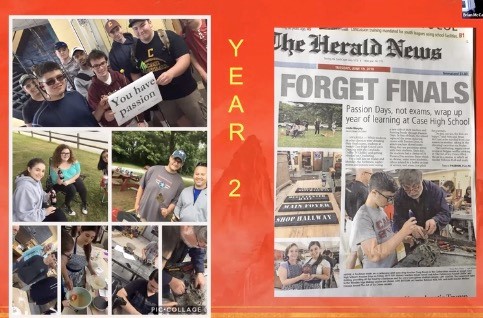
After several years, students also were allowed to demonstrate their own passions with the help of an adult in the building. The freshman field hockey team, for example, held a clinic for students.
“It’s become part of our fabric,” McCann said. “I will not apologize we don’t have final exams… because passion days have made us a stronger school.”
2) Student/Principal Shadows
McCann said he was challenged to shadow students by other leaders at NPC. The first year, he selected a senior to follow through the day, starting by riding the bus to school and attending each of his classes. “I really learned a lot,” McCann said.
In the following years, he shadowed a junior, sophomore, and then a freshman. Then a student asked if he could shadow McCann. That student sat in on a teacher evaluation (with the educator’s permission), morning announcements, a job interview, and a host of other activities. “The young man said the principal had to be an expert in a lot of different areas,” McCann says.
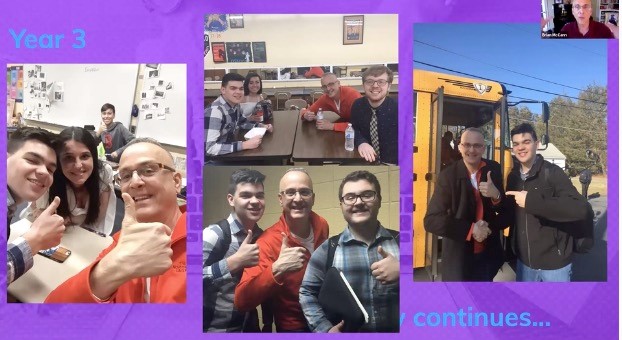
However, the real lesson learned came during this past school year, when McCann shadowed a student during COVID-19 social distancing restrictions and wound up having to eat alone at a table during lunch.
“I saw the world of school from a child’s perspective,” he said. “I never recognized the level of loneliness students had to endure during the pandemic.”
3) FedEx Days
Inspired by the work of George Couros and Daniel Pink, McCann replaced a traditional professional development day with a “FedEx Day”—one in which teachers could work on proposals they were passionate about and present them to their peers the following day—as the name suggests, delivering within 24 hours.
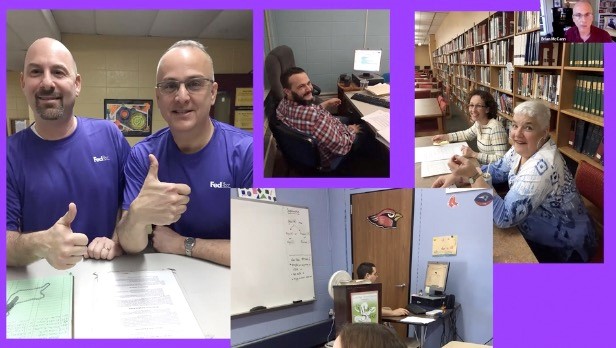
“Teachers wanted more control over professional development,” McCann said, adding that the format “gives teachers the autonomy and time to be innovative.”
Teacher-submitted proposals from the first year included reopening the school store for the first time in decades. Subsequent FedEx Days included more framing around proposals and feedback following teacher presentations. And this year, the FedEx Day contributed to 90% of the initiatives detailed in the school improvement plan. “Now you have a teacher-driven school improvement plan, so there’s buy-in,” McCann said.
4. #PositiveSignThursday
Nudged by the example of another school leader, McCann stood in front of the school one Thursday with a simple sign stating, “You Are Fabulous.”
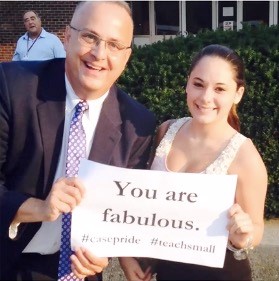
“I got such an interesting reaction,” McCann said—students asked if he would do it the following week. He’s been doing it every Thursday since, changing up the sign’s messages—You Are Kind. You Matter. You Inspire”—and posting them together on the walls of the school.
The idea spread to other schools in the state and across the country, but the local impact was most important, McCann said: “We were able to message to our community with an 11×17 piece of paper that we take risks, that we are student centered, and we believe in the power of positivity. Kind words cost nothing, and [they] not only changed the nature of my school but influenced my community’s opinion of it.”
5) Snow Day Videos
After seeing a school leader’s tongue-in-cheek video announcing a snow day on social media, McCann enlisted his video and drama teacher to take the idea to another level. Called “Project Voldemort” because of its secrecy, the three enlisted a small group of students to create a video that parodied the school musical that was released the morning of the next snow day. NPR covered the video, and it garnered more than 77,000 views.
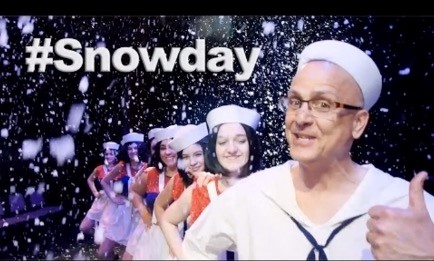
The pandemic brought with it the end of snow days last year—students learned remotely instead. So McCann instead filmed a Hamilton-inspired video welcoming students back to in-person learning that spring, which also got considerable media attention.
“Try finding a positive news story about schools in a pandemic. We gave it to them,” McCann said. “It’s fun, it’s positive, it models risk-taking.”
No Apologies
Importantly, each of these disruptions modeled expectations of innovation to students, staff, and the community—as well as a “no apologies” mindset. “You don’t need permission to be awesome,” McCann told NPC attendees.

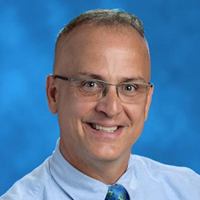
1 Comment
These are some great ideas! I love the idea of a FedEx Day…brilliant!